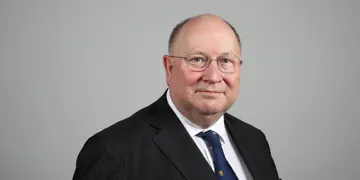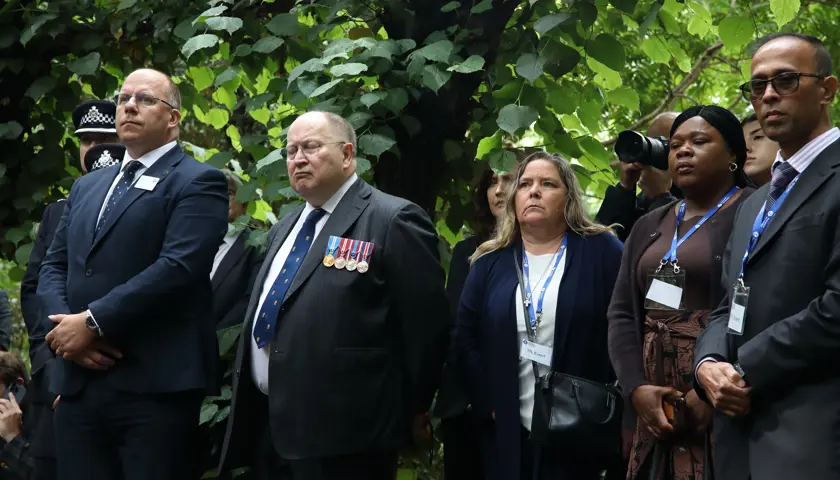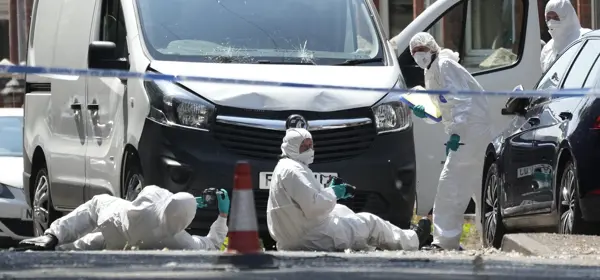In case of emergency
In case of emergency
Peter Holden is a pioneer of immediate medical care who led a remarkable response to the terrorist attack in Tavistock Square on 7 July, 2005. Recently elected as BMA treasurer, he looks back over a remarkable career. By Peter Blackburn
The events of the spring of 2001 tell you much of what you need to know about Peter Holden.
In the space of just 15 weeks Dr Holden, at the time one of the BMA GPs committee’s executive team, kicked off serious negotiations for a new national GP contract, sat the fellowship examination in immediate medical care of the Royal College of Surgeons of Edinburgh and became a father for the first time at the age of 47. All of this while a partner at an ‘outstanding’ GP practice and juggling a host of other local, regional and national roles.
‘It was quite a spring,’ Dr Holden recalls, looking back.
In truth, a similar snapshot could probably be taken from many moments of Dr Holden’s career, such are the vast and significant roles and responsibilities he has taken on over a career, which began after qualifying from Sheffield in 1979 and completing GP training in 1983.
After a couple of years of locum jobs across scores of different GP practices, Dr Holden took a permanent role at his practice in Matlock, Derbyshire, which until 2016 ran a community hospital carrying out minor-injuries work including intrapartum obstetrics and provided its own out-of-hours cover until 2004. He retired from the practice in 2023 and still works as a GP locum, on the out-of-hours service and as strategic medical adviser to East Midlands Ambulance Service NHS Trust.
Helicopter ambulance
Dr Holden’s career has been sparkling ever since those foundational moments. Alongside his daily work as a GP partner, the Yorkshireman is an eminent name in pre-hospital emergency medicine having decided to drive improvement in the field alongside three other doctors while on-hand to provide care at a motor rally in 1983.
In the following years Dr Holden co-authored a ‘seminal’ BMA board of science report on immediate medical care in 1993, helped to develop and deliver the teaching programme for the pre-hospital emergency care course delivered by BASICS (the British Association for Immediate Care) and examined by the Royal College Surgeons of Edinburgh.
In the early noughties he helped spearhead the recognition of pre-hospital emergency medicine as a sub-specialty by the GMC and became one of the initial cohort of 71 consultants in the field. For 20 years he flew regularly as a helicopter emergency medical service physician on the Lincolnshire, Nottinghamshire and MAGPAS (Mid Anglia General Practitioner Accident Service) air ambulances all on a pro-bono basis. He is the clinical trustee of St John Ambulance and vice-president of BASICS.
‘It’s been quite something – it really has been a great career,’ Dr Holden says, reflecting on a long list of achievements and memories.
On several occasions, Dr Holden has been, horribly, in the right place at the right time to deliver exactly this sort of care in horrendous situations. He was at the Hillsborough disaster just an hour into the tragedy unfolding in 1989 and helped lead the national response to the 2009 swine flu pandemic.
You certainly learn what matters in life when you've done something like this
Peter Holden, on the response to the Tavistock Square bus bombing
Perhaps most notably, Dr Holden was also on the scene in London’s Tavistock Square on 7 July 2005, when a bomb exploded on a bus outside BMA House. At the time he was one of just 50 or 60 trained major incident commanders in the country and led a group of 14 doctors from inside the building to protect staff, triage and treat the wounded and even – tragically – declare some victims beyond assistance with resources available needing to be focused on those with survivable conditions.
‘I had to do it,’ Dr Holden reflects. ‘I knew that if we didn’t declare Priority 4 and do the most for the most we would lose more people than we had to.’
One passer-by doctor at the scene following the number 30 bus being torn open said of Dr Holden’s arrival that he transformed things from ‘utter chaos’ to ‘something resembling sense’.
Now treasurer of the BMA, Dr Holden still walks through the gates where he made those difficult decisions several times a week. He says: ‘You certainly learn what matters in life when you’ve done something like this.’
Dr Holden’s recent election as treasurer of the BMA comes as little surprise. His achievements in medicine are enormous but are matched by his experience as a leader and representative for the profession.
GP contract
First elected as the GP trainee rep on Derbyshire local medical committee in 1980, then chair of his regional junior doctors (now resident doctors) committee. He was then elected to the then BMA general medical services committee as GP trainees committee chair in 1981 and remaining until 1985.
Re-elected to GMSC in 1986, he became a subcommittee chair in 1988 and subsequently elected to the executive team from 1999 to 2014. Alongside being on the team that negotiated the 2004 UK-based GP contract, he specifically negotiated the finance, infrastructure, rural and remote practice components of the 2004 deal, later supporting the Scottish GPC with negotiations on their new contract from 2015 to 2018.
His representative work has not been confined to general practice. Dr Holden also chaired the professional fees committee for 14 years and has served on almost all of the various committees of council including BMA council itself for 33 years. This year, he broke the record for membership of the GPC after passing the 44.5 year milestone set by the late Michael Wilson.
While the normal question when someone takes a leadership role might be ‘why’, here, it almost seems more apt to ask: ‘Why not?’
Dr Holden says: ‘I have been around for a long time. I carry institutional and corporate memory. We have an archive downstairs in BMA House which has only just been digitised. My knowledge is at a point where people can come to me from a negotiating team with a problem and I can say I’ve got the 1978 solution, the 1982 solution or the 2004 solution and can bring those documents up. I know we have been here before and I can show them that.’
Dr Holden first considered the role of treasurer in 2007 but the moments that followed ended up not being quite right – particularly with a young child and, at the time, the possibility of losing a lot of income when taking on that sort of role.
But that time has allowed Dr Holden to beef up his case for the job, becoming a company director of a subsidiary of a FTSE 100 company and trustee of two national charities. ‘This time I made a very firm decision. I would go in with a determined application and I think that both my career and the last 15 years – where I have been burnishing my financial credentials – make this the right time and the right job,’ he says.
So, what are Dr Holden’s intentions in the role? The two points he seems most keen to impress are his desire to build the financial sustainability of the BMA – work that he is keen to credit his predecessor Trevor Pickersgill for beginning – and to bring an experienced voice to the association’s team of chief officers in calling out government and employers for their poor treatment of staff working in the NHS.
He says: ‘Those of us old enough to remember will know the BMJ had a weekly supplement for jobs – the profits we made on that has cross-subsidised the BMA for more than 35 years. So, we’ve got to have a different business model.
‘We need to move away from the political fudges displayed over many years which said inflation is 4 per cent but doctors only got a 2 per cent pay rise, so we’ll only put subscriptions up 2 per cent. Can you imagine the electricity or gas people saying that?
‘We have got to pay what the world is charging us. That gap right now is about a cup of Costa coffee per month per member in terms of increasing subscription costs. If we get this right, we can put ourselves in a strong position over the next three to five years, if not, I don’t know if we will get the opportunity again.’
And while much of the treasurer role is dealing with BMA finances, Dr Holden will also as a chief officer, have a political role. And his message to the Government is that underfunding cannot go on and doctors can no longer be taken advantage of.
He says: ‘We live in the world's fifth or sixth largest economy. It's about priorities. And the bottom line is the state can afford those services.’
Dr Holden adds: ‘I don’t expect to have my vocation and dedication used against me. I take the view that my vocational dedication means that if it’s my wedding anniversary and there’s a big coach crash on the motorway I stay back and help rather than go out to dinner. But that cannot apply to staying behind every day to meet targets.
‘Patients are suffering because they are waiting but I’m sorry, a nation like this can afford to fund services in a way that is fair to the patient and fair to the staff. I will decide which charities I will support and the NHS isn’t on my current list.
‘The Government is playing fast and loose with our dedication and this must stop.’





